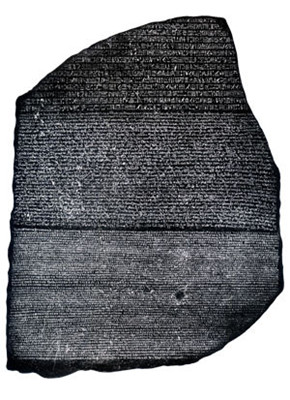The French took the stone as a cultural trophy of war, but it never made it back to Paris.
法國人將石碑視作自己的戰利品,卻從未能將其成功地運回巴黎。
Pursued by Nelson, Napoleon was defeated, and in 1801 the terms of the Treaty of Alexandria, signed by the French, British and Egyptian generals, included the handing over of antiquities-and the Rosetta Stone was one of them.
在尼羅河河口海戰中,納爾遜勛爵打敗了法國艦隊,拿破侖拋下軍隊獨自回到法國。1801年,法國向英國與埃及的將領投降。之后簽署的亞歷山大協議要求法國人交出一切文物,其中便包括羅塞塔石碑。
Most books will tell you that there are three languages on the Rosetta Stone, but if you look on the broken side, you can see that in fact there are four.
許多書籍都會告訴你—就像我剛才說的一樣—羅塞塔石碑上共有三種文字。但如果查看石碑斷面,你便會發現第四種。
Because there, stencilled on in English, you can read: "CAPTURED BY THE BRITISH ARMY IN 1801; PRESENTED BY KING GEORGE III".
上面用英文寫著“1801,英國軍隊獲于埃及”以及(在另一處)“英王喬治三世贈”。
Nothing could make it clearer that if the text on the front of the stone is about the first European empire in Africa, Alexander the Great's, the finding of the stone stands at the beginning of another European adventure-the bitter rivalry between Britain and France for dominance in the Middle East and in Africa, which had continued from Napoleon until the Second World War.
石碑表面的文字記載了非洲土地上第一個歐洲帝國—亞歷山大 帝國—的故事,而石碑的重新發現又恰逢新的歐洲列強爭奪戰的開端:英法爭奪中東與非洲統治權的斗爭,從拿破侖時期一直延續到二戰。
We asked the Egyptian writer Ahdaf Soueif for her view of this history:
我曾詢問埃及作家阿達法蘇維夫對這段歷史的看法。
"This stone so makes me think of how often Egypt has been the theatre of other peoples' battles.
羅塞塔石碑讓我想起埃及如何頻繁地成為別國戰爭的舞臺。
It's one of the earliest objects through which you can trace Western colonial interest in Egypt, because of course it was found by the French in the context of Napoleon's invasion of the country, and then appropriated by the British when they defeated him, and the French and the British argued over it.No-one seems to have considered that it belonged to neither of them.
這是最古老的能表現歐洲在埃及攫取殖民利益的物品之一。在英法兩國為它的歸屬權爭論不休時,似乎沒有人想過石碑其實不屬于他們中的任何一位。












